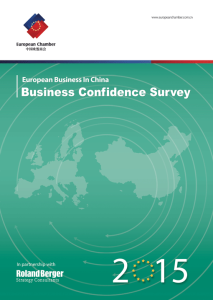 The purpose of the European Chamber’s European Business in China Business Confidence Survey is to take an annual snapshot of European companies’ successes and challenges in China.
The purpose of the European Chamber’s European Business in China Business Confidence Survey is to take an annual snapshot of European companies’ successes and challenges in China.
Published since 2004, the survey has enabled the European Chamber to build a rich data set to serve as a broad indicator of how European companies judge the business environment in China, both now and in the future.
The European Chamber invited its members to take part in the 2015 survey over a four-week period during February and March. The survey was conducted in cooperation with Roland Berger Strategy Consultants and was officially launched on 10th June, 2015.
China’s economic slowdown is here. It is already significantly impacting the performance of European business in China, which is increasingly concerned about the heightened threats that a deepening downturn will pose. In this year’s survey the percentage of European companies that ranked concerns over the Chinese economic headwinds as one of their top three business challenges is almost double that of any other challenge.
As China’s economy still has room for growth, more than half of European companies remain optimistic about their growth prospects, though this number has dropped 10 points year-on-year. However, nearly a quarter are pessimistic about their profitability outlook within the next two years and two fifths are planning to cut costs—a large jump from less than just one quarter in 2014—with most of them planning employee lay-offs. As a corollary, far fewer companies, i.e. 56 per cent—down from 86 per cent two years ago—are planning to expand their China businesses, and now only 59 per cent regard China as a top three future investment destination, down from 76 per cent in 2012. All of these developments mark significant departures from previous years, as European companies are forced to reconsider their overall China strategies in the face of a protracted Chinese economic slowdown.
The Chinese economy is facing a paradigm shift. China wants to discard the ‘old toolbox’ of high, fixed-asset investments and export-driven growth, which created unprecedented overcapacity levels and debt burden in most industrial segments. The new leadership has clearly articulated its reform vision to move the Chinese economy up the value chain.
European companies are prepared embrace the ‘new normal’, an era that will be characterised by a lower, but more qualitative economic growth pattern. The ‘new toolbox’ for this qualitative growth is still to be put in place, meaning that, while the growth pattern has already slowed, the shift up the value chain to more quality growth has yet to be realised. As Premier Li Keqiang put it in April 2015, the “new dynamics have yet to grow strong, while the old ones are losing steam.” The transition period will be difficult.
The Chinese Government is well aware that innovation will be one of the most critical drivers of this economic paradigm. However, more than two thirds of European companies that engage in research and development (R&D) do not have a R&D centre in China, and those with a R&D presence still tend to use those centres heavily for product localisation. They would contribute more to the Chinese economy if they felt more secure from threats like import substitution and technology transfer attempts, were afforded better protection under China’s intellectual property rights (IPR) laws through improved enforcement and had improved Internet access.
Foreign investment lacks a level playing field in China’s business environment, evident in the fact that 55 per cent of European companies perceive that foreign-invested enterprises (FIEs) tend to receive unfavourable treatment compared to domestic Chinese firms in their respective industries. The ongoing reform agenda has not helped in addressing this, as indicated by a fairly evenly divided response rate: one third of European companies stated that the agenda has helped to create an even playing field for foreign investors in China; one third reported that it has not; and the final third remained uncertain. The promises of China’s reforms have clearly yet to be realised.
European companies continue to view better implementation of the rule of law as the top driver for China’s economic development in the coming years. However, the three main regulatory obstacles to doing business in China—the unpredictable legislative environment, administrative issues and discretionary enforcement of regulations—remain the same as in previous years. This despite the fact that half of European companies regard the efforts of the Chinese leadership towards improving rule of law as meeting their expectations, and 85 per cent applaud the ongoing anti-corruption campaign.
Pessimism about growth and profitability outlook is at an all-time high. Persistent regulatory barriers, coupled with a disappointing lack of impact of China’s reform agenda, have served to reinforce European companies’ perceptions that progress is not being made on market access issues. Only through more uniform, strict and transparent enforcement of laws and regulations, increased market opening and support for higher value-added activities can China remain attractive to European companies.
To download a copy of the European Business in China Business Confidence Survey 2015 please go to www.europeanchamber.com.cn/en/publications-business-confidence-survey-2015.


Recent Comments